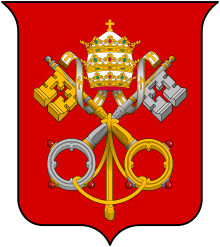Pope Alexander IV
| Pope Alexander IV | |
|---|---|
 | |
| Papacy began | 12 December 1254 |
| Papacy ended | 25 May 1261 |
| Predecessor | Innocent IV |
| Successor | Urban IV |
| Orders | |
| Consecration | March 1235 |
| Created Cardinal |
18 September 1227 by Gregory IX |
| Personal details | |
| Birth name | Rinaldo di Jenne |
| Born |
1199 or c. 1185 Jenne, Papal States, Holy Roman Empire |
| Died |
25 May 1261 Viterbo, Papal States, Holy Roman Empire |
| Previous post |
|
| Coat of arms |
|
| Other popes named Alexander | |
| Papal styles of Pope Alexander IV | |
|---|---|
 | |
| Reference style | His Holiness |
| Spoken style | Your Holiness |
| Religious style | Holy Father |
| Posthumous style | None |
Pope Alexander IV (1199 or ca. 1185 – 25 May 1261) was Pope from 12 December 1254 to his death in 1261.
Born as Rinaldo di Jenne in Jenne (now in the Province of Rome), he was, on his mother's side, a member of the family de' Conti di Segni, the counts of Segni, like Pope Innocent III and Pope Gregory IX. His uncle Gregory IX made him cardinal deacon and Protector of the Order of Franciscans in 1227, Camerlengo of the Holy Roman Church from 1227 until 1231 and Bishop of Ostia in 1231 (or 1232). He became Dean of the Sacred College of Cardinals in 1244 (or 1240). On the death of Pope Innocent IV in 1254 he was elected pope at Naples on 12 December 1254.
Alexander IV succeeded Innocent IV as guardian of Conradin, the last of the Hohenstaufens, promising him protection; but in less than a fortnight he conspired against him and bitterly opposed Conradin's uncle Manfred. Alexander IV threatened excommunication and interdict against the party of Manfred without effect. Nor could he enlist the kings of England and Norway in a crusade against the Hohenstaufens. Rome itself became too Ghibelline for the Pope, who withdrew to Viterbo, where he died in 1261. He was buried in Viterbo Cathedral, but his tomb was destroyed during sixteenth-century renovations.
Alexander's pontificate was signaled by efforts to reunite the Eastern Orthodox churches with the Catholic Church, by the establishment of the Inquisition in France, by favours shown to the mendicant orders, and by an attempt to organize a crusade against the Tatars after the second raid against Poland in 1259.
The pontiff also, in 1258, declared a canon that alleged witchcraft was not to be investigated by the Church, causing trials and burnings related to such to become largely only a Protestant affair later on.[1]
Shortly before his death, Innocent IV had granted Sicily, a papal fiefdom, to Edmund, second son of King Henry III of England. Alexander confirmed the grant in 1255 in return for 2000 ounces of gold per annum, the service of 300 knights for three months when required, and 135,541 marks to reimburse the pope for the money he had expended attempting to oust Manfred from Sicily.[2] Henry's unsuccessful attempts to persuade his subjects to pay the taxes required to meet Alexander's demands were one of the factors in the conflict between the king and parliament which culminated in the Second Barons' War.[3] On 12 April 1261, shortly before his death, Alexander issued a papal bull for King Henry that absolved him of oaths taken in the Provisions of Oxford, which was instrumental in the War.[4]
References
- ↑ Dominic Selwood, "How Protestantism fuelled Europe's deadly witch craze". The Telegraph. Published: 30 April 2014. Quote: "There would be no witch persecutions of the sort he envisaged. The Gregorian Inquisition had been established to deal with the religious matter of heresy, not the secular issue of witchcraft. Pope Alexander IV spelled this out clearly in a 1258 canon which forbade inquisitions into sorcery unless there was also manifest heresy. And this view was even confirmed and acknowledged by the infamous inquisitor Bernard Gui (immortalised by Umberto Eco in The Name of the Rose), who wrote in his influential inquisitors’ manual that, by itself, sorcery did not come within the Inquisition's jurisdiction. In sum, the Church did not want the Inquisition sucked into witch trials, which were for the secular courts."
- ↑ Simon Lloyd, Edmund Crouchback, Oxford Online Dictionary of National Biography, 2004
- ↑ J. R. Maddicott, The Origins of the English Parliament, 924-1327, Oxford University press, 2010, p. 235
- ↑ Harding, Alan. England in the Thirteenth Century. Cambridge University Press. p. 290.
-
 "Pope Alexander IV" in the 1913 Catholic Encyclopedia.
"Pope Alexander IV" in the 1913 Catholic Encyclopedia. - Richard, Jean (1999). The Crusades: c. 1071 – c. 1291. Cambridge University Press. ISBN 978-0-521-62566-1.
- Harding, Alan. England in the Thirteenth Century. Cambridge University Press. p. 290.
-
 This article incorporates text from a publication now in the public domain: Chisholm, Hugh, ed. (1911). "Alexander (popes)". Encyclopædia Britannica (11th ed.). Cambridge University Press.
This article incorporates text from a publication now in the public domain: Chisholm, Hugh, ed. (1911). "Alexander (popes)". Encyclopædia Britannica (11th ed.). Cambridge University Press.
See also
| Catholic Church titles | ||
|---|---|---|
| Preceded by Ugolino di Conti |
Cardinal-bishop of Ostia 1231–54 |
Succeeded by Hugh of Saint-Cher |
| Preceded by Innocent IV |
Pope 1254–61 |
Succeeded by Urban IV |
| ||||||||||||||||||||||||||||||||||||||||||||||||||||||||||||
| ||||||||||||||||||||||||||||||||||||||||||||||||||||||

